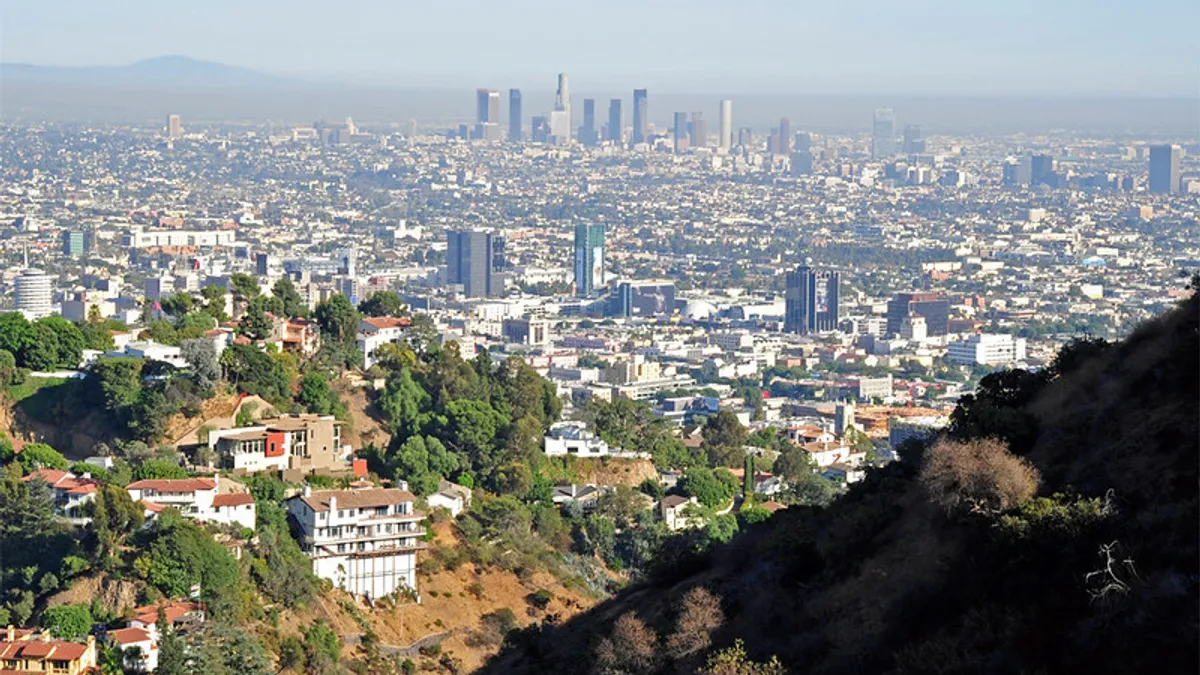Dive Brief:
-
Accelerator for America, co-founded by Los Angeles Mayor Eric Garcetti and former Executive Vice Mayor Rick Jacobs, and Mastercard's City Possible initiative announced they have raised over $10 million in private donations for direct financial assistance for Los Angeles residents, to be distributed in the form of prepaid debit cards.
-
The program, called the Angeleno Campaign, is intended to help low-wage or hourly workers whose jobs have been affected by the novel coronavirus pandemic. The prepaid cards are particularly designed to help individuals who are unbanked, in addition to undocumented residents.
-
The program received about 454,000 applications last week over the phone and online, Jacobs told Smart Cities Dive.
Dive Insight:
With 20% of Los Angeles residents living in poverty before the coronavirus, the city and their partners are using the cards to address the financial needs that the pandemic has exacerbated for those households.
A family of one or two will be eligible to receive a $700 card; a family of three to four is eligible to receive $1,100; and a family of five or more can receive a $1,500 card, according to Jacobs. The debit cards will be distributed in-person at 16 different family source centers to those who qualify.
"We simply are trying to get money into people’s hands," Jacobs said.
Traditional financial assistance is usually administered by counties, states and the federal government, not cities, according to the group's statement. And those systems typically "rely on cumbersome, check-based systems that are difficult to adjust in a crisis," the statement reads.
Providing money in the form of no-fee debit cards can be a preferred alternative as the cards are more secure than cash, and unlike checks, they don’t require bank accounts or time for the money to clear. Individuals without bank accounts are also often subject to sometimes predatory fees to cash their checks outside a bank.
The demand for money in the form of prepaid debit cards could also be evidenced by the high number of applications the campaign received. In fact, when applications first opened last week, the city's phone system crashed due to the number of calls, forcing the group to move their operation to a call center.
The demand for such a system is reinforced by the seven cities and two organizations that have already reached out to the group to learn about the program and how it can potentially be modeled in other locations, Jacobs said. The campaign received applications from 133 different cities across the country even though the program is open to only Los Angeles residents, Jacobs said.
"We are making this model available to cities nationwide as a way to solve the problems of how to physically distribute financial assistance, serve the unbanked, and serve those ineligible for federal assistance," Jacobs said in a statement. "Our mission has always been to identify and develop solutions that could be scaled and replicated by cities nationwide."
The initiative was in part born out of the City Key program introduced last summer at the U.S. Conference of Mayors summit in Honolulu. City Key was created to give state and local governments the ability to combine ID, payment and access platforms across the board, Mastercard's Head of Global Cities and City Possible Miguel Gamiño told Smart Cities Dive. The program was intended to provide identification inclusion and banking for the unbanked, he said.
Although the cards were initially anticipated to be needed in response to an earthquake or extreme weather event, not a global health pandemic, Mastercard was ready to act and adapt the cards for the needs of residents during the coronavirus, Gamiño said.
To keep up with all of our coverage on how the new coronavirus is impacting U.S. cities, visit our daily tracker.












